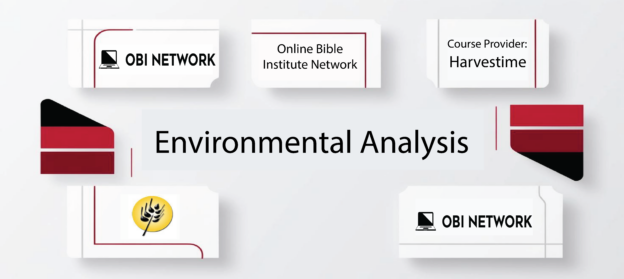Principles of Environmental Analysis

About Course
Course Description:
Students learn environmental analysis on an individual, church, and organizational basis. They learn how to analyze the spiritual environment of a village, city, state or nation prior to penetrating it with the Gospel message.
Course Introduction:
This course introduces principles of environmental analysis necessary for organizing and mobilizing spiritual resources for evangelizing.
This study stresses the importance of environmental analysis in planning strategies to reach the world with the Gospel. “Environmental analysis” is defined and reviewed in the Old and New Testament records. Instructions are given for doing a personal environmental analysis and analyzing people groups, geographic areas, nations, regions of the world, and Christian organizations.
This course is second in a series of three in the “Organizing Module” of training offered by Harvestime International Network. “Biblical Management Principles” precedes this course, and “Management By Objectives” follows it. It is recommended that these three courses be studied in their suggested order for proper understanding of the leadership, planning, and organization necessary for effective ministry.
Course Objectives:
- Define the term “environmental analysis.”
- Identify purposes for environmental analysis.
- Identify Old Testament examples of environmental analysis.
- Identify New Testament examples of environmental analysis.
- Do a personal environmental analysis.
- Analyze a geographic area.
- Analyze a nation.
- Analyze a region of the world.
- Analyze an existing Christian organization.
- Use environmental analysis to plan strategies of evangelism.
Course Requirements:
- Complete the Study Guide reading for each lesson.
- Complete the Self-Test questions for each lesson. You do not need to send us your answers. Please remember that as students preparing for ministry, your calling is not just about gaining knowledge—it’s about developing the character that reflects Christ in all aspects of life. One of the simplest yet most powerful ways to walk in integrity is by honestly and faithfully answering every self-test question in your coursework.
- As you complete each chapter you need to go to the Activity Feed and post a comment about something that interested or impacted you as you worked through the lesson. Your comment needs to be well thought out and consist of at least fifty (50) words. Ensure that you start your comment with the course name and lesson number. You also need to post comments on two other students’ recent course comments.
- Complete the Lesson Assignments. Your answers are reviewed so please write well thought out answers..
- After you have completed all of the Lessons, you will need to complete the Final Examination, the Final Paper and the Final Assignment.
Click on the link below for the Principles of Environmental Analysis Study Guide:
Principals Of Environmental Analysis
All of the ideas and principles conveyed by the instructor in this course are not necessarily held by the Online Bible Institute Network.
Course Content
Lesson 1
-
Chapter 1
